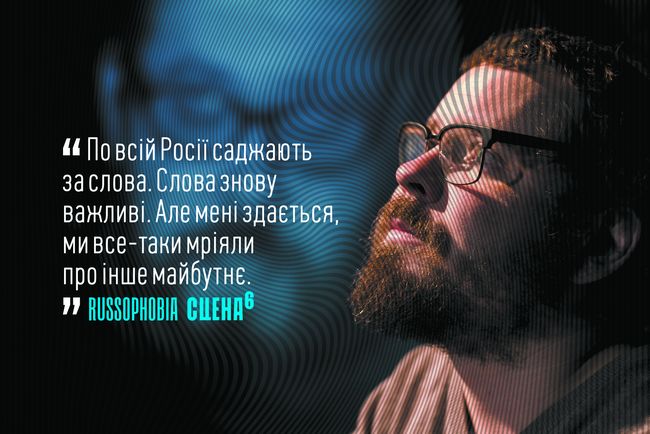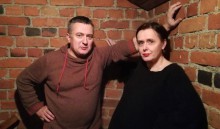Having quickly won not only Kyivan audiences, but also visitors from other cities to their side, founders of the new theater space called Stage 6 surprised and pleased the public once again. For two days, the stage was “occupied” by the international project Russophobia. The content was created by a Finnish-Russian-Ukrainian team. The original idea, created by the director of the Moscow Teatr.Doc Varvara Faer, underwent serious changes after the Ukrainian playwright Maksym Kurochkin joined the project and drew historic parallels between what was happening 80 years ago to the nation of Finland, small but aspiring to obtain sovereignty and independence from its big neighbor, and today’s events in Ukraine.
Fears and experience, hopes and reflections of the play’s characters, who are simple, ordinary people, are directly related to the themes of the long-past Winter War and the war lately unleashed by the former “brother” in Ukraine.
The Theater of Documentary Play, known as Teatr.Doc, was created in 2002 by several playwrights working in the genre of documentary theater. This is a special genre that exists at the intersection of art and topical social analysis. The theater’s creative teams make performances based on meetings with real people and dealing with the most relevant and timely issues of the surrounding reality. They use testimonies of real people, the verbatim technique, “deep improvisation,” theatrical games and trainings. Participation in prestigious theatrical festivals, both in its homeland and around Europe, has not only failed to protect the theater from rejection by the current Russian regime, but become a litmus test for it. Still, the theater is alive and keeps up its good work, which should be treated as an act of civic virtue these days, in my opinion.
According to the special genre nature of the theater, Russophobia shows an old man, his body bent down with life’s pains, remembering how his child self faced a man flying a red-starred airplane and trying to shoot him dead with a machine gun. Meanwhile, our contemporary, who lives in Kyiv, cannot forgive himself for his absence during the Maidan protest, because he was furnishing his long-awaited mortgaged apartment in Moscow. In parallel, he recalls the many occasions when he and the entire country of ours left unanswered spitting and slapping into face: from allegations about “stolen oil” to the Budapest Memorandum ultimately proving worthless. After all, there had been bad omens, blood had been shed for a long time, starting in the Baltic States that were the first to do away with the Sovietism, through Chechnya and the territories stolen from Georgia, and ending with the “polite green men” in Crimea. According to the playwright, the most difficult thing for him was to realize how totally calm people could be amid historical upheavals. And this became a chance to speak out on a topic that deeply worries him.
The show premiered in Tampere at the end of last year. The Finnish version was titled Rajavirhe (A Border Incident). However, the play’s structure and text are the same as it is staged in Finland, Russia, and Ukraine.

“All over Russia, people go down for words. Words are important again. But it seems to me we dreamed of a different future.” Russophobia, Stage 6
The cast was the troupe of one of Finland’s most famous independent theaters, the Telakka, which was named the best theater of the year in 2016. Its artists are known far beyond the country. For example, Tomi Salmela starred in Jim Jarmusch’s film Night on Earth. In the project which was seen in Kyiv, the artists, too, delighted the public with appropriate performance of their parts and high professionalism, despite the documentary theater being a quite difficult genre.
We managed to have a short talk with Varvara Faer, who is the director of the Teatr.Doc and the aforementioned performance.
Originally, the project was conceived as a retelling of the Finns’ memories about the war between their country and the USSR. It was a completely different story, one dealing with the attitude of a giant country to the world around. That attitude was unfair... With the participation of the Ukrainian playwright Maksym Kurochkin, the narrative of that war came to be seen from some completely different perspectives, as revisions of history feelings gradually yielded to dealing with the explosive point of today’s reality, which is Ukraine. Memories of the past have smoothly turned into forecasts for the future. The play has already been staged in Finland and in Ukraine, and there will be a premiere in Moscow in two days [interview was taken on March 23. – Ed.]. By the way, the latter is a challenge to the prevailing attitude there. What are your impressions of the European and Ukrainian audiences’ perception of the events happening on stage, and your assumptions about the reaction of the Russian audience?
“Yes, Finland and Ukraine have already seen the complete show, and we held a reading rehearsal in Moscow a year ago. In Finland, opinions were divided and ranged from enthusiastic to deeply indignant ones. Portions of the public, about a half of it, consider this play to be a piece of propaganda, and they do not like it. I think it applies not only to Finland, but to Europe in general. They want to think independently. They believe that not everything is so clear-cut, and maybe, Vladimir Putin is right about something. They say you need to look into the matter, to give it a thought, as nothing is 100 percent black or white. The second half pays attention to my objective with which I did this show – an outburst of emotions rather than an analytical reflection. Living emotion, human feelings, attention to history’s landmarks are important there. They are present in the context not for decoration, but as some highly important accents that must not be missed.
“The Ukrainian audience was more unanimous. Even the artists noted that the public was fantastically attentive, and this filled them with incredible energy. By the way, we have already been invited to tour all over Ukraine with this show. I hope to see you again. I can breathe so easily in your country... Let us see how the performance in Moscow will go in a day, but the reading rehearsal was very well received. One must take into account here that the Teatr.Doc caters to an opposition-minded audience, it is they who will come to watch the show.”
But what about your “persistent admirers” from the FSB?
“Do you think they will come? We will see...”








